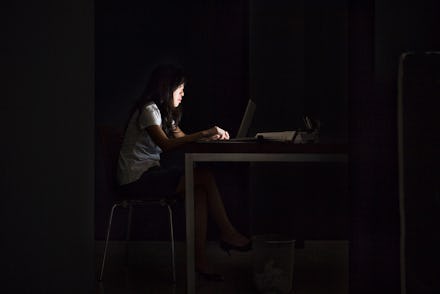Germany May Ban After-Work Emails. Here's Why the U.S. Should Follow Suit

The news: Germany might be known as the most industrious and efficient country in the European Union, but they may soon cut their workers a little more slack in that department.
German labor minister Andrea Nahles recently commissioned a study to examine the impact of work-related stress on employees. The results won't be released until 2016, but according to the Huffington Post, they're expected to prompt a novel piece of legislation by the German government: outlawing job-related emails after the end of work hours and calls after normal office hours.
"There is an undeniable relationship between constant availability and the increase of mental illness," Nahles told the Rheinische Post. "We have commissioned the Federal Institute for Occupational Safety and Health to work out whether it is possible to set load thresholds. We need universal and legally binding criteria."
Why it matters: New laws governing employee email after the end of the workday would attempt to combat a relatively new form of work-related stress associated with the rise of smartphones. The ease with which we can access email in particular has presented a new and unique set of issues. Constant availability creates a never-ending workday, even when you leave the office. And even if we choose not to respond to after-hours communication, it's still in the back of our minds, compounding the stress that piles up during the day.
The United States could take a cue from Germany. Workers around the world are expected to endlessly toil away at their jobs, but the United States has it particularly bad. Americans are overworked, overstressed and have less and less time for leisure. That comes with high costs, whether a person incurs that stress in the office or away from it. The American Psychological Association has warned employers of the terribly health effects of poor scheduling and a lack of down-time between projects, whether an employee is in a physical office or not.
The deluge of work emails poses problems for American "vacations" as well. The Center for Economic and Policy Research reports that the United States is the only only advanced economy that doesn't require employees to receive paid vacation time. It also found that 1 in 4 Americans don't get paid time off. As Mic's Jared Keller wrote in Pacific Standard, the culture around working too much doesn't help. In the United States, "'I'm working late' is seen as a sign of occupational devotion and hard work. In today's competitive economy, [it] often means being reachable — and responsible — at least over email, well after the close of business."
What this boils down to, in effect, is an obliteration of the divide between "work" life and "normal" life. The two are more entwined than ever, and it's taking its toll: Working too much can lead to health problems like depression, heart attacks and heart disease.
So what now? Germany will certainly face some challenges if it decides to go ahead with this legislation. For one, a blanket law wouldn't differentiate between different industries, a problematic situation for fields like finance or media, where around-the-clock work can be the difference between staying afloat and falling behind.
"Maybe the government could help companies to make up unique rules for their firms, or put pressure on managers," Antje Schmid, who works for an advertising company in Frankfurt, told the Huffington Post. Regardless of any potential pitfalls, attitudes like this are promising in a world that has increasingly gravitated toward the "work" side of the so-called work-life balance.
It's likely that Germany may pursue incremental rules rather than a blanket ban. In April, an agreement between a federation of French employers, from engineering and consulting companies, and two unions of workers placed restrictions on work emails after 6 p.m. in a move to protect the workers' health and well-being. While many outlets misreported that France had banned all after-work emails to millions of employees, the new rule only affected 250,000 workers.